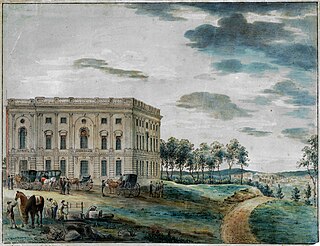
Canton is a town, incorporated in 1806, located in the Farmington Valley section of the Capitol Planning Region, Connecticut, United States. The population was 10,124 as of the 2020 census. It is bordered by Granby on the north, Simsbury on the east, Avon and Burlington on the south, New Hartford on the west, and Barkhamsted on the northwest. Running through it is the Farmington River. The town includes the villages of North Canton, Canton Center, Canton, and Collinsville. In September 2007, Collinsville was ranked in Budget Travel magazine as one of the "Ten Coolest Small Towns In America".

The 9th United States Congress was a meeting of the legislative branch of the United States federal government, consisting of the United States Senate and the United States House of Representatives. It met in Washington, D.C., from March 4, 1805, to March 4, 1807, during the fifth and sixth years of Thomas Jefferson's presidency. The apportionment of seats in the House of Representatives was based on the 1800 United States census. Both chambers had a Democratic-Republican majority.

Jonathan Trumbull Jr. was an American politician and military officer who served as the governor of Connecticut, speaker of the United States House of Representatives, and lieutenant governor of Connecticut. He is often confused with his younger brother, John Trumbull, a famous artist during the revolutionary war and early years of the United States.

Since Connecticut became a U.S. state in 1788, it has sent congressional delegations to the United States Senate and United States House of Representatives, beginning with the 1st United States Congress in 1789. Each state elects two senators to serve for six years in general elections, with their re-election staggered. Prior to the ratification of the Seventeenth Amendment in 1913, senators were elected by the Connecticut General Assembly. Each state elects varying numbers of members of the House, depending on population, to two-year terms. Connecticut has sent five members to the House in each congressional delegation since the 2000 United States Census.

Calvin Willey was an American politician from Connecticut who served in the United States Senate from 1825 to 1831.

Lafayette Sabine Foster was an American politician and lawyer from Connecticut. He served in the United States Senate from 1855 to 1867 and was a judge on the Connecticut Supreme Court from 1870 to 1876.
Jonathan Sturges was an American lawyer, jurist and politician from Fairfield, Connecticut. He represented Connecticut as a delegate to the Continental Congress and in the United States House of Representatives.

The 1806–07 United States House of Representatives elections were held on various dates in various states between April 29, 1806 and August 4, 1807. Each state set its own date for its elections to the House of Representatives before the first session of the 10th United States Congress convened on October 26, 1807. They occurred during Thomas Jefferson's second term. Elections were held for all 142 seats, representing 17 states.
Lyman Law, son of Richard Law and father of John Law, was a United States representative from Connecticut. He was born New London, Connecticut. He pursued classical studies and was graduated from Yale College in 1791. He studied law and was admitted to the bar in 1793 and commenced practice in New London.

Clark Bissell was the 34th governor of Connecticut. He served as an associate justice of the Connecticut Supreme Court from 1829 to 1839. He had previously served as a member of the Connecticut House of Representatives representing Norwalk and the Connecticut Senate representing the 12th District.

The 1806–07 United States Senate elections were held on various dates in various states. As these U.S. Senate elections were prior to the ratification of the Seventeenth Amendment in 1913, senators were chosen by state legislatures. Senators were elected over a wide range of time throughout 1806 and 1807, and a seat may have been filled months late or remained vacant due to legislative deadlock. In these elections, terms were up for the senators in Class 3.

North Carolina elected its members August 15, 1806.

Maryland elected its members October 6, 1806.
Massachusetts elected its members November 3, 1806.

The 1806 United States House of Representatives election in Delaware was held on October 7, 1806, to elect the U.S. representative from Delaware's at-large congressional district. Incumbent Federalist James M. Broom faced re-election to a full term after winning the previous year's special election. He was challenged by three Democratic-Republicans.

The 1806 United States Senate election in Pennsylvania was held from December 9 to 16, 1806. Andrew Gregg was elected by the Pennsylvania General Assembly to the United States Senate.
The 1806 United States elections occurred in the middle of Democratic-Republican President Thomas Jefferson's second term, during the First Party System. Members of the 10th United States Congress were chosen in this election. Neither chamber saw significant partisan change, with the Democratic-Republicans retaining a commanding majority in both the House and Senate.

The 1806 Connecticut gubernatorial election took place on April 10, 1806. Incumbent Federalist Governor Jonathan Trumbull Jr. won re-election to a ninth full term, defeating Democratic-Republican candidate William Hart in a re-match of the previous year's election.














